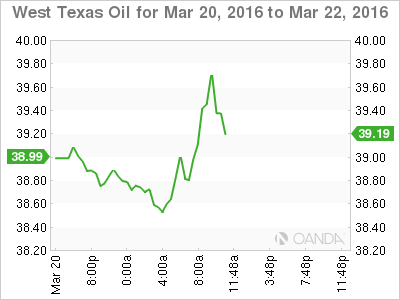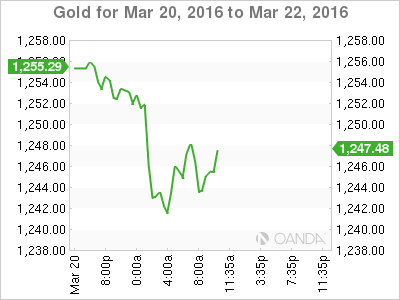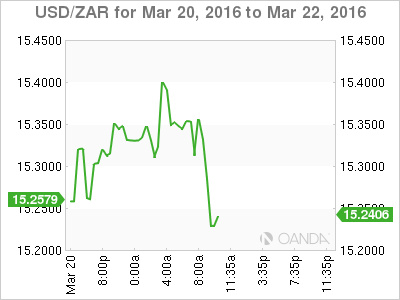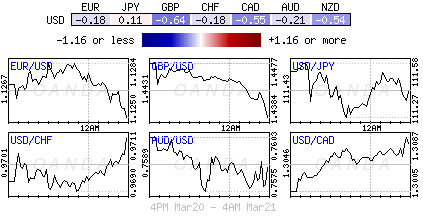Volatility across global financial markets is at a two-month low as signs central banks will keep borrowing costs lower for longer settle investor nerves that frayed at the start of the year.
U.S. stocks were little changed after last week erasing losses for the year, while European shares slipped. The Shanghai Composite Index topped 3,000 for the first time in two months amid plans to loosen margin-lending curbs. Treasuries retreated, the pound fell as tensions within the ruling Conservative Party deepened and crude fluctuated near $39.50 a barrel in New York.
Markets have calmed after a volatile first six weeks of 2016, which saw U.S. equities post the worst opening period on record. While policy easing by the European Central Bank and Bank of Japan and a forecast for a shallower trajectory of U.S. interest-rate increases helped settle price swings, investor confidence remains fragile.
“Markets have had a pretty tremendous month, we’re pretty far extended and certainly due for some pullback,” said Michael James, managing director of equity trading at Wedbush Securities Inc. in Los Angeles. “It’s been a pretty impressive run, but even with all that heavy lifting we’ve had, all it’s done is gotten to flat on the year. I would expect the market’s going to take a breather and it should.”
The Bank of America Merrill Lynch Market Risk Index, a gauge tracking volatility expectations for equities, bonds, currencies and commodities, fell to minus 0.24 on Friday, the least since Jan. 6.
Equities
The S&P 500 Index slipped 0.1 percent at 9:31 a.m. in New York, after capping a fifth straight weekly gain that wiped out a loss in 2016 that reached as much as 11 percent in February.
Deals boosted the market, while energy shares slumped. Valspar Corp. surged after Sherwin-Williams Co (NYSE:SHW). agreed to buy the company for about $9.3 billion. Starwood Hotels & Resorts Worldwide (NYSE:HOT) advanced after accepting an improved bid from Marriott International Inc. valued at $13.6 billion. Valeant Pharmaceuticals International (NYSE:VRX). fell amid a shakeup in the company’s board.
Glencore (LON:GLEN) and Antofagasta (LON:ANTO) helped pull resource-related companies to the biggest drop among European equities, while Total SA (PA:TOTF) dragged oil stocks lower. Telecom Italia (MI:TLIT) climbed 3.4 percent after saying that Chief Executive Officer Marco Patuano is discussing the terms of his resignation. Gas Natural SDG SA added 1.3 percent after changing its dividend proposal and increasing its payout ratio.

Commodities
The Bloomberg Commodity Index, which measures returns on raw materials, dropped 0.1 percent as gold and U.S. natural gas prices declined.
Gold fell for a third day as the dollar stabilized. Bullion for immediate delivery declined 1 percent to $1,243.10 an ounce, bringing the three-day decline to 1.5 percent.
Copper for delivery in three months rose 0.3 percent to $5,055 a metric ton on the London Metal Exchange. China’s imports of the metal grew by more than 50 percent compared with the same month a year ago to 328,604 metric tons, the General Administration of Customs said in e-mailed statement.
Brent crude added 0.3 percent to $41.34 a barrel. Oil markets have recouped their losses this year after slumping to a 12-year low last month on speculation stronger demand and falling U.S. output will ease a surplus. While speculators became the most bullish on U.S. oil last week since June, the nation’s stockpiles are the highest in more than 80 years and still expanding.

Currencies
The South African rand slipped 0.6 percent as the ruling African National Congress vowed to investigate allegations that President Jacob Zuma’s friends are influencing his administration’s policy, even as it said it retained confidence in his ability to lead.
The pound fell from a one-month high versus the dollar, sliding 0.6 percent to $1.4393 after Pensions Secretary Iain Duncan Smith resigned from the cabinet just three months before a referendum on Britain’s European Union membership.
The yuan weakened as the People’s Bank of China cut the fixing by 0.3 percent, the most in three months.

Emerging Markets
The MSCI Emerging Markets Index was little changed after entering a bull market Friday. Shares in Poland dropped from the highest close since November. Gulf stocks declined, with benchmarks in Abu Dhabi and Dubai losing at least 0.2 percent.
The Shanghai Composite gauge advanced 2.2 percent and the Hang Seng China Enterprises Index of mainland shares listed in Hong Kong increased 0.5 percent.
China Securities Finance Corp., the state-backed agency that provides funding to brokerages for margin trading, said late Friday it will restart offering loans to securities firms for periods ranging from 7 days to 182 days. A surge in margin loans fueled the stock boom in the first half of last year, and exacerbated the slump that followed.
Bonds
German 10-year government bond yield stayed at 0.21 percent after ECB Governing Council member Francois Villeroy de Galhau told a conference in Paris that “the euro area is faced with deflationary pressures.”
U.S. Treasuries slipped, pushing the 10-year yield two basis points higher to 1.89 percent.
Indian bonds advanced, sending the 10-year yield down two basis points to 7.5 percent, headed for lowest close since July 2013. The government’s decision to cut rates on small savings plans has boosted speculation the central bank will further ease monetary policy at its next meeting on April 5.
The latest series of benchmarks measuring the cost of insuring corporate debt against default started trading today. The Markit iTraxx Crossover Index linked to 75 companies with mostly junk ratings cost 302 basis points, compared with 309 basis points for the previous series at the close of trading on Friday, according to data compiled by Bloomberg.
